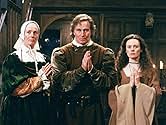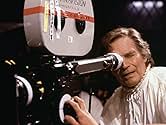Ajouter une intrigue dans votre langueKing Henry VIII wants to divorce his wife, and seeks the approval of the aristocracy. Sir Thomas More is a man of principle and reason, and is thus placed in a difficult position: should he ... Tout lireKing Henry VIII wants to divorce his wife, and seeks the approval of the aristocracy. Sir Thomas More is a man of principle and reason, and is thus placed in a difficult position: should he stand up for his principles, risking the wrath of a corrupt King fond of executing people ... Tout lireKing Henry VIII wants to divorce his wife, and seeks the approval of the aristocracy. Sir Thomas More is a man of principle and reason, and is thus placed in a difficult position: should he stand up for his principles, risking the wrath of a corrupt King fond of executing people for treason? Or should he bow to the seemingly unstoppable corruption of King Henry VIII, ... Tout lire
- Réalisation
- Scénario
- Casting principal
- Récompenses
- 1 victoire et 2 nominations au total
- Cardinal Wolsey
- (as Sir John Gielgud)
- Richard Rich
- (as Jonathon Hackett)
Avis à la une
But he made sure he did get to do another screen version after appearing on stage in the production of Robert Bolt's play. He did something else too, what you see Heston in is how it actually was originally presented on stage with the Everyman Character, done here by Roy Kinnear, as a narrator.
When Bolt did the 1966 version for the screen, he adapted his own work and dropped the Everyman character probably because Fred Zinneman who directed the film wanted it that way. I believe Zinneman was right that what he did was better suited for the screen.
That's not to decry Heston's performance because as a man who made a career out of playing great men of character and integrity, Thomas More was definitely a role he was most suited for. I can certainly understand his disappointment. By the way, Heston's other goal never realized was to do Abraham Lincoln, but I'm guessing he never got a suitable script or story.
With son Fraser Clarke Heston as producer, I'm sure Heston got to pick who he would appear with and we are fortunate to have John Gielgud as Cardinal Wolsey, though Orson Welles in build and in acting style was much more suited for the role. Heston's very good friend from across the pond, Richard Johnson, got to play the key role of the Duke of Norfolk.
Though this production of A Man For All Seasons suffers from comparison to the Paul Scofield version, it can definitely stand on its own merits and Charlton Heston and the rest of the cast have nothing to be ashamed of.
Le saviez-vous
- AnecdotesMore was tried for High Treason for opposing the King's desire to be named head of the Church in England. Charges of treason were used to silence opposition to the King. When the Founding Fathers drafted the U.S. Constitution, cases such as More's led them to define treason in narrow terms, that is, "Treason against the United States, shall consist only in levying war against them, or in adhering to their enemies, giving them aid and comfort. No person shall be convicted of treason unless on the testimony of two witnesses to the same overt act, or on confession in open court."
- GaffesIn all the scenes which are supposed to take place on or near the River Thames, the waterbody is clearly a narrow lake, not a river.
- ConnexionsVersion of Un homme pour l'éternité (1966)
- Bandes originalesOriginal Tudor Music
Composed by Henry VIII (as H.R.H. Henry VIII)
Meilleurs choix
Détails
- Date de sortie
- Pays d’origine
- Langue
- Aussi connu sous le nom de
- A Man for All Seasons
- Lieux de tournage
- Sociétés de production
- Voir plus de crédits d'entreprise sur IMDbPro





















